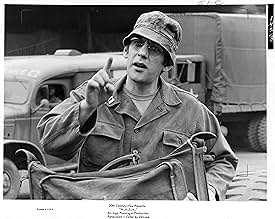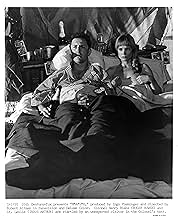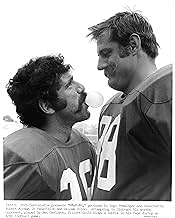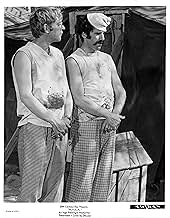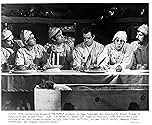Lo staff di un ospedale militare da campo durante la guerra di Corea deve ricorrere ad un senso dell'umorismo talvolta assurdo per mantenere la propria sanità di fronte agli orrori della gue... Leggi tuttoLo staff di un ospedale militare da campo durante la guerra di Corea deve ricorrere ad un senso dell'umorismo talvolta assurdo per mantenere la propria sanità di fronte agli orrori della guerra.Lo staff di un ospedale militare da campo durante la guerra di Corea deve ricorrere ad un senso dell'umorismo talvolta assurdo per mantenere la propria sanità di fronte agli orrori della guerra.
- Vincitore di 1 Oscar
- 15 vittorie e 26 candidature totali
Timothy Brown
- Cpl. Judson
- (as Tim Brown)
Trama
Lo sapevi?
- QuizThe fourteen-year-old son of director Robert Altman, Mike Altman, wrote the lyrics to the theme song "Suicide is Painless." Because of its inclusion in the subsequent television series, he continued to get residuals throughout its run and syndication. His father was paid $75,000 for directing, but his son eventually made about $2 million in song royalties, with payments continuing, from first syndication through the present day, as MASH (1972) continues in syndication around the world.
- BlooperAt the 14 minute mark you can see Trapper in the operating theater, but he hasn't yet arrived to the 4077th.
- Curiosità sui creditiThe shot of Hot Lips being revealed in the shower was replaced with her exiting the helicopter in network and basic cable showings when Sally Kellerman's name was announced.
- Versioni alternativeSome of the scenes that were altered in the US "PG" version:
- The arterial spurting from the neck of a patient in the operating room was removed.
- When O'Houlihan is surprised in the shower, the tent flap begins to rise but the scene cuts away before seeing her.
- The "F-word" was removed from the football game.
- ConnessioniEdited into Give Me Your Answer True (1987)
- Colonne sonoreSuicide Is Painless
(1970)
Music by Johnny Mandel
Lyrics by Mike Altman
Sung by an unidentified chorus during the opening credits
Also sung by Ken Prymus (uncredited) during the last supper scene
Recensione in evidenza
"MASH" broke barriers and defied conventions when it was first released in 1970. It still does today.
The pendulum has swung back a lot since 1970, and for that you still get a sense of the pioneering spirit with which the film was made. The overlapping dialogue. The non-linear, character-driven plot. The caustic humor. The attacks on religion (real religion, as the New York Times noted when the film came out, not false sanctimony but actual belief in God.)
Yes, in those ways the film is as powerful now as it was when it was first released. But you see something else, something audiences didn't see in 1970, so blown away were they by the newness of it. That is the picture runs out of gas halfway through.
You have a powerful beginning, that eerie montage with the strange song "Suicide Is Painless" playing mournfully while doctors, nurses, and orderlies silently rush to relieve choppers of their human cargo. It's quietly effective, immediately giving you a sense of the 4077th MASH unit (looking much bigger and grimmer than it ever did in the TV series) and coming as close as the movie ever does to delivering an effective anti-war statement. The movie builds from there as we meet the various characters, beneficiaries of their actors' strong improvisational work. It feels like real-time eavesdropping on a community of actual human beings. Scenes like Major Burns and Hot Lips' transmitted tryst and Painless Pole's suicide attempt are not as funny as we are meant to think, but they are well shot, especially the Painless Pole bit, the best thing in the movie for pure entertainment. The way all the guys in the Swamp crack up when Painless tells them he's decided to kill himself may be the film's funniest moment.
What happens next feels like a wrong turn. Hot Lips becomes the subject of a camp bet that exposes her to massive humiliation. Call it "indecent" or "politically incorrect," it is just plain wrong, exposing the film's (and its director's) nasty streak toward women and alienating any concern you might have built up for the characters. When she and Burns were targeted before, you had a sense they had it coming because of her overbearing military approach and his blaming orderly Boone for killing a patient. This time, she's a spent force, no threat to anyone, and "a damn good nurse," as Trapper says, just doing her job as best she can despite her earlier bad experience. I'm struck dumb at the idea I'm supposed to be laughing when she rushes into Col. Blake's tent in shock and tears.
The film never recovers. Instead, it veers wildly off course, away from the camp and into two radically pointless subplots, one involving a trip by Hawkeye and Trapper to Japan where they operate on a congressman's son and a sick infant (some sort of parallel there, though lost on me), the other a football game that apparently was director Robert Altman's comment on the folly of war, but to me just shows what happens when you allow your characters to veer off-script for so long you can't make it back to the ending as written. The game takes up too much time, throws in goofy circus music complete with slide whistles, and features the once iron-willed Hot Lips in the role of outlandishly enthusiastic cheerleader for all the people who tormented her so viciously for the duration of the film. Sally Kellerman's performance in the second half of the film is nothing like it was in the first half; it's embarrassingly, cartoonishly bad. Altman should have reined her in, but you get the feeling he was just rushing by then to get it all in the can before the studio figured out what he was up to and took his film away.
Altman was just so much better making "Nashville." Obviously he learned a lot. It's amazing how pasty everyone in this film looks, particularly Donald Sutherland, who seems leprous. No wonder he tried to get Altman fired. So much of the supporting players faded away, and though they do good work, it's not a surprise. They all seem so squalid and ugly as Altman shoots them.
It's interesting comparing the characters here to their counterparts in the TV series. For me, the TV characters are usually preferable. Robert Duvall mines zero comedy from Frank Burns, playing him very seriously in comparison to Larry Linville's more likeably miserable TV Burns. Roger Bowen had a great voice, but is nearly robotic as Blake, having none of McLean Stevenson's panache. What's worse than a pompous moralizing Hawkeye with Groucho affectations? How about that annoying whistle! Even Gary Burghoff, the one real holdover from film to series, plays a nastier Radar in the movie, meaner, tougher, less innocent.
The whole film is mean, tough, less innocent. It gets points from me for that. Altman and his cast develop a magnificent mood right away. But they fail to do very much with it. "MASH" is a great 45-minute-long movie that just goes on too long.
The pendulum has swung back a lot since 1970, and for that you still get a sense of the pioneering spirit with which the film was made. The overlapping dialogue. The non-linear, character-driven plot. The caustic humor. The attacks on religion (real religion, as the New York Times noted when the film came out, not false sanctimony but actual belief in God.)
Yes, in those ways the film is as powerful now as it was when it was first released. But you see something else, something audiences didn't see in 1970, so blown away were they by the newness of it. That is the picture runs out of gas halfway through.
You have a powerful beginning, that eerie montage with the strange song "Suicide Is Painless" playing mournfully while doctors, nurses, and orderlies silently rush to relieve choppers of their human cargo. It's quietly effective, immediately giving you a sense of the 4077th MASH unit (looking much bigger and grimmer than it ever did in the TV series) and coming as close as the movie ever does to delivering an effective anti-war statement. The movie builds from there as we meet the various characters, beneficiaries of their actors' strong improvisational work. It feels like real-time eavesdropping on a community of actual human beings. Scenes like Major Burns and Hot Lips' transmitted tryst and Painless Pole's suicide attempt are not as funny as we are meant to think, but they are well shot, especially the Painless Pole bit, the best thing in the movie for pure entertainment. The way all the guys in the Swamp crack up when Painless tells them he's decided to kill himself may be the film's funniest moment.
What happens next feels like a wrong turn. Hot Lips becomes the subject of a camp bet that exposes her to massive humiliation. Call it "indecent" or "politically incorrect," it is just plain wrong, exposing the film's (and its director's) nasty streak toward women and alienating any concern you might have built up for the characters. When she and Burns were targeted before, you had a sense they had it coming because of her overbearing military approach and his blaming orderly Boone for killing a patient. This time, she's a spent force, no threat to anyone, and "a damn good nurse," as Trapper says, just doing her job as best she can despite her earlier bad experience. I'm struck dumb at the idea I'm supposed to be laughing when she rushes into Col. Blake's tent in shock and tears.
The film never recovers. Instead, it veers wildly off course, away from the camp and into two radically pointless subplots, one involving a trip by Hawkeye and Trapper to Japan where they operate on a congressman's son and a sick infant (some sort of parallel there, though lost on me), the other a football game that apparently was director Robert Altman's comment on the folly of war, but to me just shows what happens when you allow your characters to veer off-script for so long you can't make it back to the ending as written. The game takes up too much time, throws in goofy circus music complete with slide whistles, and features the once iron-willed Hot Lips in the role of outlandishly enthusiastic cheerleader for all the people who tormented her so viciously for the duration of the film. Sally Kellerman's performance in the second half of the film is nothing like it was in the first half; it's embarrassingly, cartoonishly bad. Altman should have reined her in, but you get the feeling he was just rushing by then to get it all in the can before the studio figured out what he was up to and took his film away.
Altman was just so much better making "Nashville." Obviously he learned a lot. It's amazing how pasty everyone in this film looks, particularly Donald Sutherland, who seems leprous. No wonder he tried to get Altman fired. So much of the supporting players faded away, and though they do good work, it's not a surprise. They all seem so squalid and ugly as Altman shoots them.
It's interesting comparing the characters here to their counterparts in the TV series. For me, the TV characters are usually preferable. Robert Duvall mines zero comedy from Frank Burns, playing him very seriously in comparison to Larry Linville's more likeably miserable TV Burns. Roger Bowen had a great voice, but is nearly robotic as Blake, having none of McLean Stevenson's panache. What's worse than a pompous moralizing Hawkeye with Groucho affectations? How about that annoying whistle! Even Gary Burghoff, the one real holdover from film to series, plays a nastier Radar in the movie, meaner, tougher, less innocent.
The whole film is mean, tough, less innocent. It gets points from me for that. Altman and his cast develop a magnificent mood right away. But they fail to do very much with it. "MASH" is a great 45-minute-long movie that just goes on too long.
I più visti
Accedi per valutare e creare un elenco di titoli salvati per ottenere consigli personalizzati
Dettagli
Botteghino
- Budget
- 3.500.000 USD (previsto)
- Lordo Stati Uniti e Canada
- 81.600.000 USD
- Lordo in tutto il mondo
- 81.600.000 USD
- Tempo di esecuzione1 ora 56 minuti
- Colore
- Proporzioni
- 2.35 : 1
Contribuisci a questa pagina
Suggerisci una modifica o aggiungi i contenuti mancanti



